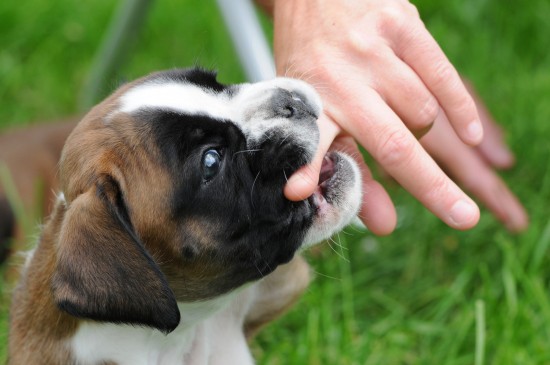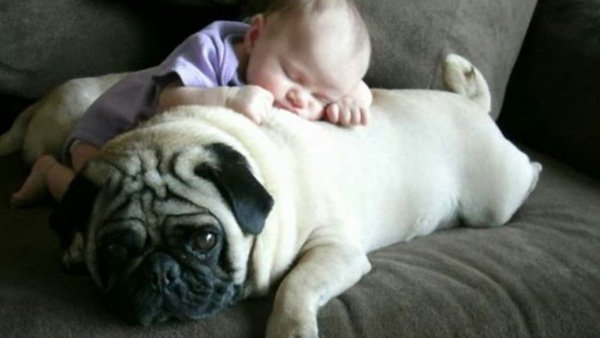

There are few things more distressing for the dog owner or dog lover than being bitten by a dog or seeing their dog bite somebody else, and of course, being bitten can be extremely dangerous and upsetting as well.
But the fact remains that dogs rarely bite out of the blue and without any warning, and in the vast majority of cases, dogs bite for one of five specific reasons, which, once you are aware of them, you can take steps to avoid.
Read on to learn about the main five reasons behind why dogs bite.
Dogs are territorial animals, and also have a tendency to be possessive, both over the things that they perceive as theirs (such as food or toys) and over the people and property that they view as their job to protect. Guarding dogs may be trained to bite or display defensive aggression as part of protecting people and property, such as in the case of working German Shepherds and various other breeds.
If your dog feels that somebody on their territory shouldn’t be there, they may act to defend their territory, going as far as to bite. Similarly, if your dog is not properly trained to leave things when they are told to and not to guard their food and toys, you may find that they will snap or bite if you get too close to them or try to take something away from them.
We all know that feeling ill can make us extremely grumpy, and if you have an injury or a pain in a specific part of the body, you will normally be very sensitive about this area and protective about anyone touching it. The same is true for dogs, and of course, dogs cannot tell you where they are hurting, and the chances are that you will have to touch them to find out where they are hurt or injured. This can lead to the risk of your dog biting or snapping, as a natural and unplanned reaction to having someone touch them where it hurts.
Even if your dog just generally feels under the weather and is not suffering from an injury or pain in a specific area, they will have a tendency to be less tolerant and more short-tempered than normal.
A dog that feels threatened, cornered, intimidated or frightened may well snap or lash out defensively, in an attempt to thwart your approach and protect themselves from a perceived attack.
This is particularly the case with shy or nervous dogs, and those who have been mistreated. This is known as defensive aggression, and rarely happens without several key warning signs being displayed by the dog first. Do not ignore growling, snarling, raised hackles or any other indications that the dog in question is alarmed or unhappy, as these dogs will only bite or snap as a last resort, and will not be likely to attack unprovoked.
Some dogs and particularly puppies do not have good bite inhibition, meaning that they do not have a good understanding of acceptable use of their teeth versus going too far! This is something that puppies usually learn by experience from the reactions that they get from their littermates and handlers, but even the most good natured and well trained dog may bite in play without realising that they are doing harm.
Dogs that get very excited when playing with you might begin to grab at your arm or leg with their teeth, often catching hold of you gently without ever breaking the skin. However, when your dog is excited, playing rough and tumble and getting carried away, their judgement may become impaired and they may not realise quite how hard they are grabbing you!
When playing with your dog, don’t let them get so overexcited that they begin to forget their manners, and stop and calm down the game at the stage when your dog starts grabbing you with their teeth.
When somebody creeps up on you makes you jump, you might react in any manner of different ways. Most of us will yell, jump or flinch, but depending upon the perceived threat and the natural reactions of the person involved, it is not uncommon to lash out in shock.
The same is true for your dog; if they are relaxing and suddenly someone jumps out on them, wakes them from sleep or appears right in front of them without warning, it is not unheard of for even the best natured of dogs to snap or bite, without giving it any thought. Your dog will usually be incredibly sorry after doing this, but by that point the damage has been done!
Nobody likes being shocked, so try to ensure that you do not startle your dog either, by waking them up suddenly or not letting them see your approach until you are right on top of them.
 How To Help Your Cat When They Lose A Limb
How To Help Your
How To Help Your Cat When They Lose A Limb
How To Help Your
 Places Where You Should Not To Buy A Kitten
Places Where You
Places Where You Should Not To Buy A Kitten
Places Where You
 Breeding From Your Dog - Delivering The Puppies
Breeding From You
Breeding From Your Dog - Delivering The Puppies
Breeding From You
 Gorgeous White Coated Cats – But Are They Prone To Deafness?
Gorgeous White Co
Gorgeous White Coated Cats – But Are They Prone To Deafness?
Gorgeous White Co
 What Are The Common Reasons Of Giving Your Preference To Dog Boarding?
What Are The Common Reasons Of Giving Your Preference To D
What Are The Common Reasons Of Giving Your Preference To Dog Boarding?
What Are The Common Reasons Of Giving Your Preference To D
Copyright © 2005-2016 Pet Information All Rights Reserved
Contact us: www162date@outlook.com